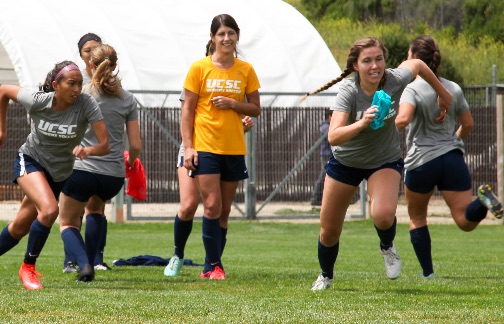Campus News
Athletics opinion poll wins student support
63 percent of voting undergraduate students were in favor of establishing a new undergraduate fee that would be approximately $90 per student per quarter.

UC Santa Cruz students showed strong support for the campus’s NCAA Division III athletics program, with 63 percent of voting undergraduates signaling that they would be willing to establish a new fee.
A record 43 percent of undergraduates voted in this year’s election. Of those, 63 percent were in favor of establishing a new undergraduate fee that would be approximately $90 per student per quarter. Undergraduate students will vote in spring 2017 on establishing a new student fee.
Additionally, two committees—one comprised of faculty and one comprised of UC Santa Cruz Foundation board members and alumni councilors—are looking at sustainable funding models for the program.
“The results of this year’s opinion poll underscores that this is an important program for our campus,” Chancellor George Blumenthal said. “I look forward to considering sustainable funding models for this program so that it can be on secure financial footing for years to come.”
UC Santa Cruz offers NCAA Division III athletic teams in men’s and women’s basketball, cross-country, soccer, swimming/diving, tennis, and volleyball; and women’s golf and track. All the teams will continue to compete next year.
More than 6,000 undergraduate students casts votes in the election that ran from May 11–17. Full election results can be viewed online later this week.
“I have enjoyed watching our scholar-athletes give their all both in the classroom and while competing in their chosen sport. I am proud to see that fellow students have demonstrated support for our program,” Campus Provost/Executive Vice Chancellor Alison Galloway said. “I’m hopeful that the attention—from faculty, community members, students and others—to NCAA athletics will further strengthen the program.”
The opinion poll asked students whether they would support a new student fee of about $90 per quarter ($270 per year) to support the current NCAA program at UC Santa Cruz.
UC Santa Cruz leadership determined in 2014 that it would not be sustainable to fund the program for the years to come and offered funding through 2016–17 so that the program could try to transition to financial support from student fees.